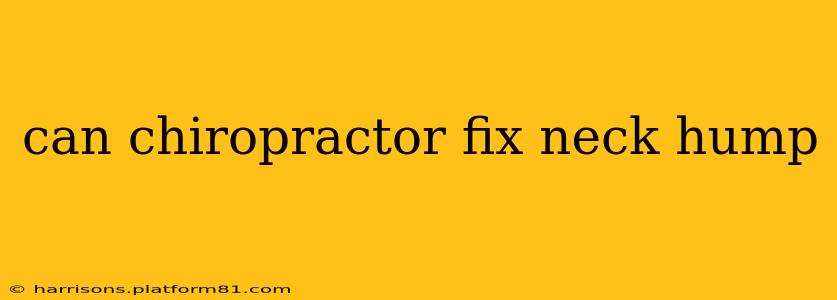Can a Chiropractor Fix a Neck Hump? Understanding Dowager's Hump and Treatment Options
A "neck hump," often referred to as a dowager's hump or kyphosis, is a noticeable curvature of the upper spine, resulting in a rounded or hunched posture. While a chiropractor can play a role in managing this condition, it's crucial to understand the limitations and complexities involved. This article explores whether a chiropractor can fix a neck hump, delving into the causes, treatment options, and the role of chiropractic care.
What Causes a Neck Hump (Dowager's Hump)?
A neck hump isn't simply a matter of poor posture; it's often a symptom of underlying issues. The most common cause is osteoporosis, a condition weakening the bones and increasing the risk of vertebral fractures. These fractures can contribute to the forward curvature of the spine. Other contributing factors include:
- Scheuermann's kyphosis: A condition affecting adolescents, resulting in an abnormally rounded upper back.
- Poor posture: While not directly causing bone deterioration, prolonged poor posture can exacerbate existing curvature and contribute to muscle imbalances.
- Ankylosing spondylitis: A type of arthritis affecting the spine, causing inflammation and stiffness.
- Congenital conditions: Some individuals are born with spinal deformities that lead to kyphosis.
Can a Chiropractor Help with a Neck Hump?
A chiropractor can't fix a neck hump caused by osteoporosis or other structural issues, as they cannot repair fractured vertebrae. However, chiropractic care can offer significant benefits in managing the condition and improving related symptoms. Chiropractic treatment focuses on:
- Improving spinal alignment: Gentle adjustments can help to restore proper spinal alignment, reducing pain and improving posture.
- Strengthening core muscles: Exercises prescribed by a chiropractor strengthen the muscles supporting the spine, helping to counteract the forward curvature.
- Reducing pain and stiffness: Chiropractic manipulation can ease pain and stiffness associated with the hump, improving mobility and function.
What Treatments are Available for a Neck Hump?
Treatment depends heavily on the underlying cause and severity of the kyphosis. Options may include:
- Medication: For osteoporosis, medication can help increase bone density and reduce the risk of further fractures.
- Physical therapy: Strengthening exercises and stretches help improve posture and flexibility.
- Bracing: In some cases, a brace can help support the spine and reduce the curvature.
- Surgery: For severe cases of kyphosis, surgery may be necessary to correct the curvature.
Can Chiropractic Care Prevent a Neck Hump?
While chiropractic care can't prevent genetic predisposition or age-related bone loss, it can play a preventative role by promoting good posture and strengthening core muscles. Regular chiropractic check-ups and lifestyle adjustments can contribute to better spinal health and reduce the risk of developing kyphosis.
What Exercises Can Help Improve Posture and Reduce a Neck Hump?
Strengthening the back and core muscles is crucial. A chiropractor can recommend specific exercises, but some helpful examples include:
- Chin tucks: Gently pulling your chin backward, strengthening neck muscles.
- Shoulder blade squeezes: Squeezing your shoulder blades together, engaging the upper back muscles.
- Plank exercises: Strengthening core muscles crucial for posture.
- Back extensions: Strengthening the muscles that extend the spine.
Is Surgery Necessary for a Neck Hump?
Surgery is typically only considered for severe cases of kyphosis causing significant pain, neurological problems, or respiratory issues. It's a last resort after other conservative treatments have failed.
In Conclusion:
A chiropractor can be a valuable part of a comprehensive treatment plan for a neck hump, but they cannot cure the underlying cause, especially if it's due to osteoporosis or severe structural issues. Chiropractic care primarily focuses on improving symptoms, posture, and overall spinal health through adjustments, exercises, and other therapeutic methods. If you are concerned about a neck hump, it is crucial to consult with your doctor or a qualified healthcare professional to determine the cause and develop an appropriate treatment plan. They can guide you to the appropriate specialists, including a chiropractor, orthopedist, or rheumatologist, depending on the specific needs of your condition.
